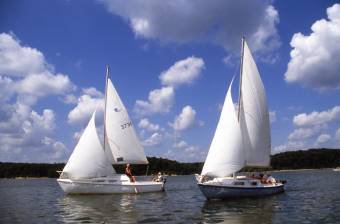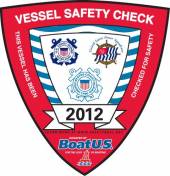User Tools
Vessel Safety Checks of Scout Camp and Sea Scout boats
Most Boy Scouts of America camps have an aquatics program, generally referred to as the waterfront. Camp waterfronts are very professionally operated, and usually include one or more of the following activities: swimming, lifesaving, canoeing, rowing, small-boat sailing, kayaking. A typical Scout camp waterfront will involve dozens of watercraft, mostly under 18 feet in length.
Boy Scouts of America safety standards require that all vessels, whether owned by BSA or by others, that are used in a BSA aquatics program must have an annual Vessel Safety Check (VSC). VSCs are conducted by CG qualified Vessel Examiners, and are most often Coast Guard Auxiliarists or members of the U.S. Power Squadrons. Conducting a VSC annually serves as a safety check to ensure that Scout boats are properly equipped, and also provides the Vessel Examiner an opportunity to discuss and promote recreational boating safety. It is also an excellent opportunity to promote the Coast Guard Auxiliary to the Scouts and their leaders.
Lessons learned
For Scout Camp
- For Camp Rangers – Contact a local Vessel Examiner early in the year, ideally before the boating season gets busy. If no Vessel Examiners are listed in the VE database, contact your local Coast Guard Auxiliary flotilla to request a vessel examination. Depending on the size of your vessels, the Vessel Safety Check may take anywhere from 15 minutes to an hour each.
- For Vessel Examiners – Contact the local Scout Council to offer Vessel Safety Checks a their Scout camp. The best time of year for this is before camp opens in June. You will want to talk to the person responsible for the council's camps or property. The Ranger is the adult responsible for the camp and is a good person to start with. Remember to bring copies of the Federal Requirements & Safety Tips for Recreational Boats publication, as well as information about your flotilla. Be prepared to answer questions about recreational boating safety and about the Coast Guard Auxiliary. Don't assume that you will be contacted. Be sure to alert the Ranger about upcoming public education opportunities in your area.]
For Sea Scouts
- For Sea Scout leaders – Contact a local Vessel Examiner early in the year, ideally before the boating season gets busy. If no Vessel Examiners are listed in the VE database, contact your local Coast Guard Auxiliary flotilla to request a vessel examination. Depending on the size of your vessel, the Vessel Safety Check may take anywhere from 15 minutes to an hour. Provided that the Vessel Examiner has the time, take the opportunity to ask questions.
- For Vessel Examiners – Contact the local Sea Scout Ships to offer a Vessel Safety Check. Remember to bring a copy of the Federal Requirements & Safety Tips for Recreational Boats publication, as well as information about your flotilla to the VSC. Be prepared to answer questions about recreational boating safety and about the Coast Guard Auxiliary. The Ship's (unit's) Skipper is the unit leader and is the best place to start. Don't assume that you will be contacted. Be sure to alert the Skipper about upcoming public education opportunities in your area.
Resources
Scouting
Contributed by
- Steve Alexander, FSO-MT - Flotilla 24-02, 5th District (Southern Region)
- Bruce Johnson, FSO-MT - Flotilla 22-02, 5th District (Southern Region)




